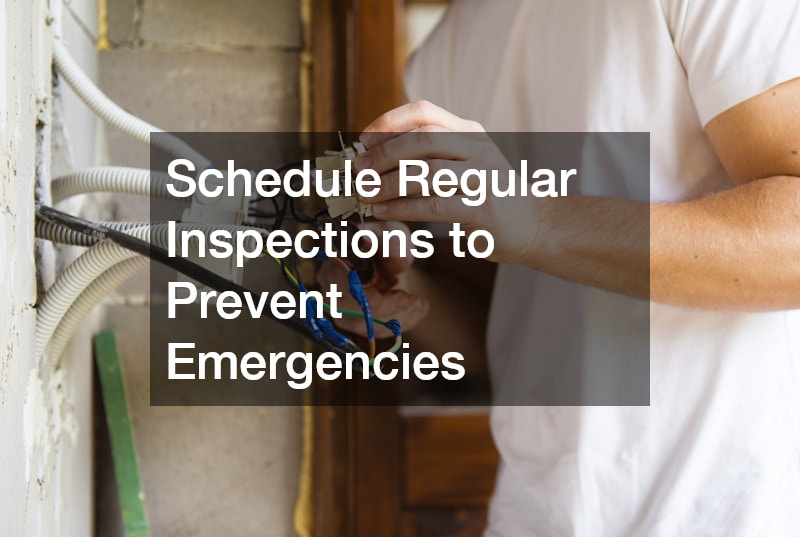
Unexpected home repairs and emergencies can strike at any time, often bringing stress, inconvenience, and financial strain. Whether it’s a leaky roof, a malfunctioning water heater, or a clogged drain, being unprepared can make these situations even more challenging. That’s why having a plan in place is essential for every homeowner.
Proactive maintenance and preparation can significantly reduce the risk of costly emergencies and help you handle unexpected repairs with ease. Services like routine HVAC service, roof cleaning, and plumbing maintenance services ensure your home stays in top condition, minimizing surprises. Additionally, having a toolkit and emergency contacts on hand can make a big difference when issues arise.
This guide will walk you through practical steps to prepare your home for unforeseen repairs and emergencies. With the right strategies, you can protect your home, save money, and enjoy peace of mind knowing you’re ready for whatever comes your way.
1. Schedule Regular Inspections to Prevent Emergencies

Proactive inspections are the foundation of preventing unexpected home repairs. Regular check-ups on critical systems can identify minor issues before they become costly emergencies.
HVAC Service
Start with your heating and cooling system. Schedule bi-annual HVAC service to ensure it operates efficiently year-round. Inspections can reveal worn-out components, dirty filters, or airflow issues that, if left unaddressed, could lead to breakdowns during peak seasons.
Roof Cleaning and Inspection
The roof is another essential area to monitor. Over time, debris and algae can accumulate, compromising its integrity. Professional roof cleaning not only improves aesthetics but also prevents mold growth and water damage. Pair this with regular inspections to catch loose shingles, leaks, or other potential problems.
Plumbing System Checks
Partner with plumbing maintenance services to inspect your pipes, fixtures, and drains. Routine checks can detect hidden leaks, corrosion, or blockages that might lead to water damage.
By scheduling these inspections, you establish a maintenance routine that significantly reduces the likelihood of unexpected repairs and keeps your home systems running smoothly.
2. Maintain Your Roof and Gutters
Your roof and gutters are your home’s first line of defense against the elements. Regular care ensures their longevity and functionality.
Roofing Services and Repairs
Engage professional roofing services for inspections and maintenance. They can address issues like missing shingles, leaks, or weak spots with timely roof repair. A well-maintained roof protects your home from weather-related damage and costly interior repairs.
Gutter Maintenance
Clogged gutters can lead to water pooling, foundation damage, and even roof leaks. Regularly clean gutters and downspouts to ensure proper drainage. During roof cleaning, check for debris buildup in gutters that could compromise their function.
Prepare for Extreme Weather
Storms can take a toll on your roof and gutters. Strengthen these areas in advance by addressing vulnerabilities. Roofing professionals can provide reinforcements to protect your home.
By maintaining your roof and gutters, you ensure your home’s structure remains resilient against the elements, reducing the risk of sudden, expensive repairs.
3. Keep Your Plumbing System in Check

Plumbing problems are among the most disruptive home emergencies, but regular care can prevent most issues.
Plumbing Maintenance Services
Partner with professional plumbing maintenance services to keep your system in excellent condition. Routine checks can identify small leaks, corroded pipes, or damaged fixtures before they escalate into major repairs.
Drain Cleaning
Schedule regular drain cleaning to prevent clogs and backups. Over time, grease, hair, and debris can accumulate in your pipes, leading to slow drainage or blockages. Professional drain cleaning ensures clear and efficient water flow, minimizing risks of flooding.
Prepare for Repairs
Keep basic tools on hand for minor issues, like a plunger for clogged toilets or a wrench for tightening loose fittings. Be prepared to address emergencies quickly while waiting for professional assistance.
By maintaining your plumbing system and scheduling professional services, you can avoid unexpected disruptions and keep your home running efficiently.
4. Service Your Water Heater Regularly
Your water heater plays a vital role in your daily comfort, and neglecting its maintenance can lead to inconvenient breakdowns.
Routine Maintenance
Schedule annual water heater maintenance to flush out sediment that accumulates over time. This buildup can reduce efficiency and cause overheating, shortening the unit’s lifespan. Professionals can inspect for leaks, corrosion, or worn-out components that need replacing.
Recognize Warning Signs
Keep an eye out for signs of trouble, such as fluctuating water temperatures, discolored water, or unusual noises. These often indicate issues like mineral buildup or failing heating elements.
Energy Efficiency Upgrades
Consider upgrading to a more energy-efficient model if your current water heater is outdated. Tankless water heaters, for example, provide hot water on demand and reduce energy consumption.
By prioritizing regular maintenance, you ensure a consistent hot water supply and avoid emergency replacements.
5. Prepare for Heating and Cooling Emergencies

Your HVAC system is crucial for maintaining a comfortable home, especially during extreme weather. Regular care can help you avoid sudden breakdowns.
HVAC Service
Schedule routine HVAC service to check for issues like clogged filters, worn-out components, or refrigerant leaks. Professional maintenance ensures efficient operation, prolongs the system’s lifespan, and minimizes the need for costly repairs.
Air Conditioning Repair
Know the signs of trouble, such as weak airflow, uneven cooling, or unusual noises. Timely air conditioning repair can prevent minor problems from escalating into full system failures during the hottest months.
Emergency Contacts
Keep the contact information for reliable HVAC professionals handy in case of unexpected breakdowns. A quick response can make all the difference during an emergency.
Proactive HVAC care keeps your home comfortable and reduces the likelihood of costly, inconvenient repairs.
6. Monitor Your Home’s Exterior for Hazards
The exterior of your home requires regular attention to prevent damage from environmental factors.
Tree Services
Overgrown trees can pose a significant risk during storms. Hire tree services to trim branches, remove dead trees, and inspect for potential hazards. Proper tree maintenance protects your home from falling debris and improves curb appeal.
Inspect Siding and Windows
Check for cracks, warping, or gaps that could let in moisture or pests. Repairing these issues promptly prevents further damage.
Foundation and Drainage
Ensure that your home’s drainage system directs water away from the foundation. Clear outdoor drains and address pooling water to avoid structural damage.
By monitoring your home’s exterior, you minimize risks and maintain its safety and durability.
7. Build a Basic Emergency Toolkit
A well-stocked emergency toolkit can save valuable time during unexpected repairs.
Essential Tools
Include basics like a hammer, pliers, wrenches, duct tape, and screwdrivers. Add specialty tools like a drain snake for minor drain cleaning or a plunger for quick toilet repairs.
Safety Gear
Keep gloves, goggles, and a flashlight in your kit for safe handling of repairs. Include batteries and a portable power bank for added convenience during power outages.
Emergency Contacts
List contact information for essential services, including roofing services, plumbers, HVAC technicians, and tree services.
An emergency toolkit ensures you’re prepared to handle small issues immediately while awaiting professional help.
8. Prepare for Electrical Emergencies
Electrical problems can disrupt daily life and pose safety risks. Taking precautions reduces the likelihood of emergencies.
Preventive Maintenance
Inspect wiring, outlets, and circuit breakers regularly for signs of wear or damage. If you notice flickering lights or tripped breakers, consult a professional electrician immediately.
Backup Power
Consider investing in a generator to maintain power during outages. This is especially important for homes relying on electric-powered HVAC systems or medical equipment.
Know When to Call a Professional
Attempting DIY fixes for complex electrical issues can be dangerous. Always hire certified electricians for major repairs or installations.
Proactive electrical care ensures your home remains safe and functional during emergencies.
9. Develop a Backup Plan for Essential Systems
Unforeseen repairs can disrupt your home’s essential systems. Having a backup plan ensures you stay prepared.
Generators and Power Backup
A generator provides emergency power during outages, keeping HVAC systems, refrigerators, and essential appliances running.
Spare Supplies
Stock extra filters for your HVAC system and essential parts for minor plumbing fixes. These items can help bridge the gap until professional repairs are completed.
Alternative Heating and Cooling
Keep portable heaters or fans available in case of HVAC failures, ensuring your home remains livable during repairs.
Backup solutions minimize the impact of emergencies, keeping your household comfortable and functional.
10. Create a Maintenance Schedule
A regular maintenance schedule helps prevent emergencies and keeps your home in top condition.
Seasonal Tasks
Plan seasonal checks for critical systems, such as roof cleaning in spring and HVAC tune-ups in summer and fall. Include drain cleaning and tree services to ensure your plumbing and exterior stay in good shape.
Annual Inspections
Schedule yearly inspections for your roof, water heater, and plumbing system. These proactive checks reduce the risk of unexpected failures.
Reminders and Logs
Use digital reminders or a calendar to stay on track with maintenance tasks. Logging completed services provides a record of your home’s upkeep history.
A consistent maintenance routine ensures you’re prepared for emergencies and extends the lifespan of your home’s systems.
Conclusion
Being prepared for unexpected home repairs and emergencies is essential for maintaining a safe, functional, and stress-free living space. By scheduling regular maintenance with professionals like roofing services, plumbing maintenance services, and HVAC service, you can prevent many common issues from escalating. Proactive care, such as roof cleaning, drain cleaning, and routine checks on your water heater, ensures your home’s systems are always in top condition.
Additionally, building an emergency toolkit and keeping a list of reliable service contacts for air conditioning repair, toilet repairs, and tree services makes it easier to address problems as they arise. Incorporating seasonal maintenance tasks and creating a structured upkeep schedule helps you stay organized and ahead of potential emergencies.
By taking these steps, you’ll protect your home, reduce repair costs, and enjoy greater peace of mind knowing you’re ready to handle any challenges that come your way.





